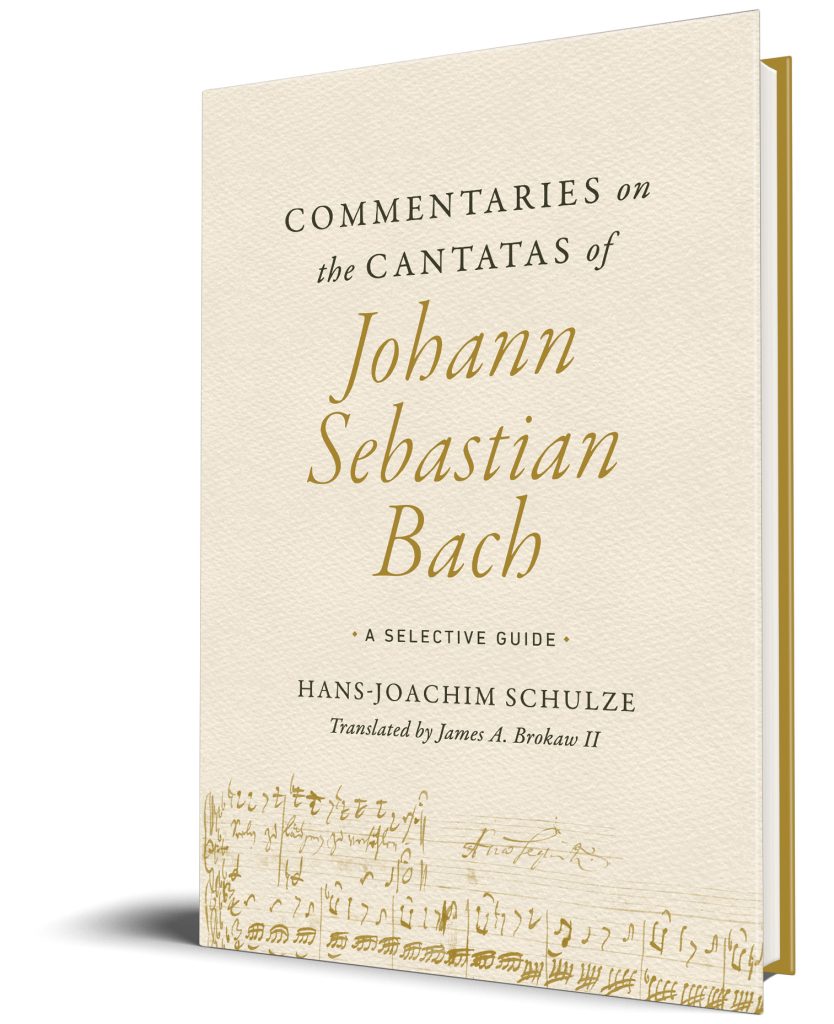James A. Brokaw II, the translator of Commentaries on the Cantatas of Johann Sebastian Bach: A Selective Guide, answers questions on his new book.
Q: Why did you decide to write this book?
Schulze’s foregrounding of text was a big selling point for me. As a German major in college I was interested in poetry (senior thesis on the poetry of Hugo von Hofmannsthal) and I found the Baroque era in German literature to be particularly interesting, formed as it was in the catastrophe of the Thirty Years War. Schulze’s book, which reads Bach’s cantata texts in that context as well as that of their biblical origins, is quite illuminating. The structure of the book with its 225 free-standing essays appealed to me because I thought that structure made a web-based digital solution not only feasible but desirable.
Q: What is the most interesting discovery you made while researching and writing your book?
While I was certainly aware that Bach had created an innovative type of chorale cantata, in which the modern operatic forms of recitative and aria are integrated by modifying the interior strophes of the text, I now have a more finely grained appreciation for how challenging a task this was, thanks to Schulze’s commentaries. I come away impressed with the degree to which Bach’s texts—particularly those of Lehms—are decidedly anti-rational–even though we revere Bach as a key figure of the Enlightenment.
Q: What myths do you hope your book will dispel or what do you hope your book will help readers unlearn?
Certainly the most important commonly held myth is that Bach’s texts are inferior and do not deserve our attention. Instead they have been poorly understood. This bias is rooted first of all in the comparison with classicists of the later eighteenth century: Goethe Schiller and Lessing. But it also has to do with parody. With its ideological bias toward originality, the Romantic era regarded works of parody—the process of crafting a new text for an existing musical work—with disdain. Schulze demonstrates how exacting and demanding this literary artistry actually is.
Q: Which part of the publishing process did you find the most interesting?
Once it became clear that a printed translation of Schulze’s entire book would not be practical, the task of selecting essays for the abridged volume was especially rewarding since I wanted to include not only those essays on Bach’s best known and most beloved cantatas, but also those essays that best illuminated his life, working conditions, creative milieu and associates. In addition, I particularly enjoyed applying my background as a software developer to structuring the digital edition on IOPN. This entailed devising a metadata scheme that would include a truly comprehensive set of parameters, and importing Schulze’s extensive index of persons by constructing a relational database that associated essay titles and identifiers with index entries.
Q: What is your advice to scholars/authors who want to take on a similar project?
Particularly if translating works on this scale, devise your own style sheet with as much detail as possible before submitting your work to the copy editor. Think carefully about how to structure your translation: are there some aspects that are best left in the original language? In this case, familiar chorale titles in peripheral contexts, and eighteenth century collection titles that do not translate well fall into this group.
Q: What do you like to read/watch/or listen to for fun?
I particularly enjoy early music broadcasts on the German network MDR-Klassik—and especially Michael Maul and Bernhard Schrammek’s magnificent series on the Bach cantatas (which Maul tells me he thinks of as Schulze 2.0).
Hans-Joachim Schulze is the leading authority on the music of Bach and its source traditions, on which he has authored over 500 books and articles.

James A. Brokaw II is an independent scholar and translator.

